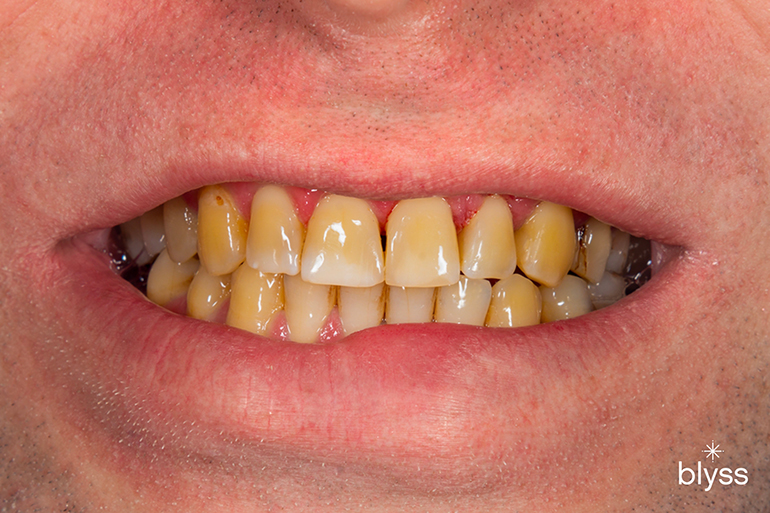Whether due to decay, gum disease, or injury, tooth loss is a common problem in the United States.
And while there are many options for replacement teeth, dental implants are often considered the best solution because they look and function most like natural teeth.
However, because they require surgery, dental implants can be expensive. The good news is that there are several ways to help cover the cost of dental implants.
Here are ten ways to pay for dental implants.
Option 1: Personal Savings Account
If you have been diligently setting money aside for a rainy day, now might be the time to dip into those emergency savings to pay for your dental implants.
If you don’t need implants right away, another option is simply to start saving up now so that you can pay for them outright when the time comes.
This will obviously take longer than some of the other options on this list, but it will allow you to avoid taking on debt or asking others for financial assistance.
Plus, there’s nothing wrong with taking your time to make such a major decision—after all, implant surgery is a lifelong investment!
Option 2: Dental Insurance
Previously, dental insurance did not cover dental implants. But these days, if you have dental insurance, you may be able to use it to help pay for the your implants.
This will depend on the specifics of your policy, how much coverage you currently have, and how much money is remaining in your annual deductible.
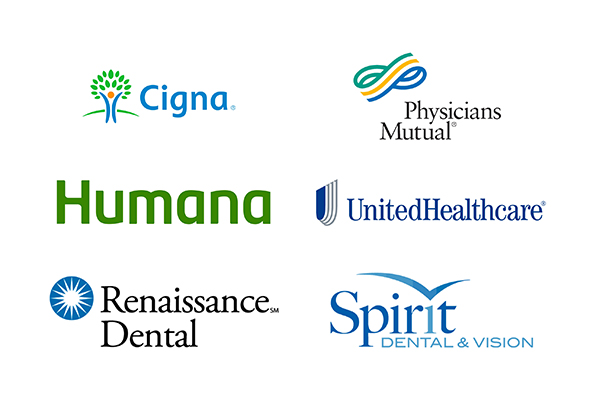
There are many different dental implant insurance providers to choose from, but not all of them are created equal. Be sure to do your research to find the best provider for you. Consider things like cost, coverage, and network when making your decision.
Some major dental insurance providers cover up to 100% of the cost of select implant surgeries, while other providers only offer partial coverage depending on how severe your condition is or how many teeth need to be replaced.
To find out how much (if any) coverage you have, contact your insurer directly and ask about their policies regarding implant surgery.
They should be able to provide a list of surgeons and dentists who are in-network with your plan, as well as how much (if any) of the cost of your surgery will be covered.
The Fine Print with Dental Insurance
Even if your surgery is covered under your plan’s benefits, it’s always important to review the fine print carefully.
This information will typically be outlined in the Summary of Benefits portion of your insurance contract and can include how much (if any) you will need to contribute towards a copay or how many appointments or visits you may need before surgery can be performed.
Also, be on the lookout for the following:
- Missing Tooth Clause. This is a clause that states how much (if any) of the cost of your implant surgery will be covered if you are missing one or more teeth prior to surgery.
- Waiting Period. If your insurance policy requires a “waiting period” before surgery, this is how long after the initial application you will have to wait before receiving treatment.
- Set Rate. Your insurance company may include a cap on how much they will pay for your treatment. This is referred to as a “set rate,” and it can limit how much you are able to contribute towards the cost of surgery.
- Pre-existing Conditions. If you have any pre-existing medical conditions, such as diabetes or heart disease, you may not be eligible for dental implants through your insurance.
- Co-Payments and Deductibles. Co-payments and deductibles are the out-of-pocket costs that you will be responsible for paying.
- Maximum. Some insurance policies come with a yearly maximum, which is how much you can spend on medical expenses in any given year. Many insurances have a $2000 per year maximum. This will barely cover the cost of one dental implant. Some insurance plans may also have a “lifetime maximum,” which is how much you can spend on medical expenses over your entire lifetime.
Dental Implant Tip: If you do decide to use your dental insurance plan to pay for implants, be sure to check how much of the total cost will be covered by your policy before scheduling an appointment with a dentist in San Diego. You may also want to consider comparing the cost of different dentists and implant types to ensure you get the best value from your insurance coverage.
Option 3: Dental Financing
The most common way people pay for dental implants is to apply for dental financing.
Dental financing gives you the option to pay for dental work over an extended period, usually between two and seven years. This can make dental care more affordable by breaking down the cost into monthly payments that are similar to what you might pay for a car ($250-$650).
The best financing options are available for people with credit scores of 680 or above. But at Blyss Dental, we work with several financing companies that go below that number.
Most dentists offer dental financing options. They may allow you to pay for your implants in monthly installments or over a certain period of time.
At Blyss Dental, we offer various dental implant financing options with zero interest for up to 24 months. We also have conventional loan financing for big dental implant treatments with payment terms that can go up to 84 months.
To apply for a dental financing plan, start by talking to your dentist about their different payment options. Ask how to get pre-qualified and how much you would need to pay upfront or in monthly installments.
Types of Dental Financing
- Medical Credit Cards: Medical credit cards are similar to regular store credit cards, but they offer special financing options for medical procedures. Your dentist or another healthcare provider may offer these cards, and typically come with a low-interest rate or no interest at all. Popular providers are Care Credit and Alphaoen.
- Conventional Loan: If you have excellent credit and a high income, you may consider applying for a conventional loan. This type of financing is similar to getting a mortgage from the bank, with interest rates typically ranging from 6% – 27%.
- Personal Loan: Another option for financing is a personal loan. Banks or credit unions advertise these loans, and they come with interest rates ranging from 5% – 36%.
- Zero Percent Intro: If you have excellent credit and a high income, you may qualify for a zero percent intro promotion. These promotions can help you get your implants at no interest for some time, typically between 3 – 12 months.
Can I finance dental implants with bad credit?
Although it may be difficult to finance dental implants if you have bad credit, there are some options available.
DENTAL FINANCING OPTIONS FOR BAD CREDIT
| MEDICAL & DENTAL LOANS | DENTAL CREDIT CARDS | PERSONAL CREDIT CARDS | PAYMENT PLANS |
|
|---|---|---|---|---|
| Interest Rates | 4%-36% APR | 0% with deferred interest | 0% with deferred interest | Varies by dentist |
| Credit Score Needed | 580-690 | 580-640 | 300-639 | Possibly none; 580-640 |
| Loan Amount | Up to $100,000 | $300-$10,000+ | $300-$10,000+ | Varies by dentist |
Source: www.creditrepair.com
One approach is to apply for a personal loan from your bank or credit union. Because these loans tend to have stricter approval requirements than medical credit cards, you will likely need good or excellent credit to qualify.
If your credit history does not meet these standards, another option is to consider a co-signer on the loan. A co-signer with good or excellent credit can help you get approved and get a lower interest rate.
Some lenders specialize in loans for people with bad credit. And while the interest rates on these loans will be higher than those for people with good credit, they will still be lower than the interest rates on payday loans or auto title loans.
Another option is to use a peer-to-peer lending platform like LendingClub or Prosper. These platforms allow you to borrow money from individual investors and often have lower interest rates than traditional loans. However, there is no guarantee in these loans, so it is important that you have a solid repayment plan in place before applying.
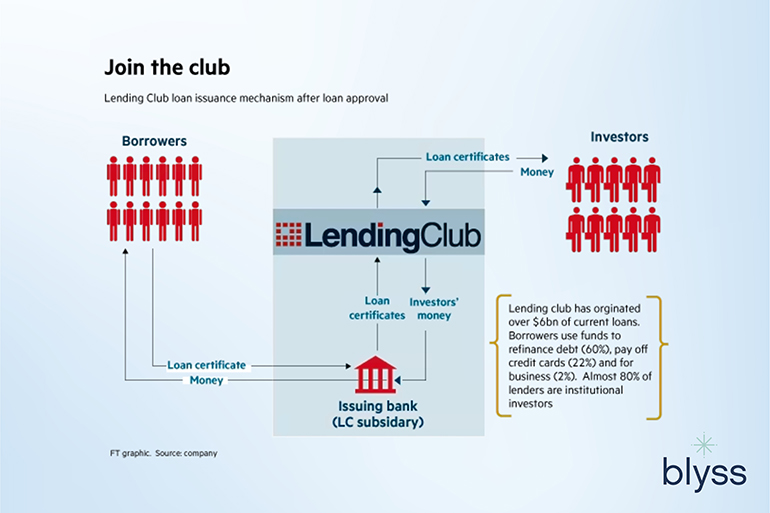
Taking out a loan can be a risky proposition—especially if you’re borrowing money from a peer-to-peer lending platform. Before taking out a loan, make sure that you are confident that you will be able to repay it in full and on time.
While these financing options may seem appealing for their low-interest rates, it is important to consider how much you will actually end up paying in the long run.
Be sure to also assess any fees, interest charges, and other potential costs associated with the financing plan you opt for before signing up.
Dental Implant Tip: At Blyss Dental, we want to help you achieve your dream smile. That’s why we don’t work with only one or two financing options – we work with 12! Some of the typical financing options we work with are Lending Point, Care Credit, Proceed, Aphaeon, and Lending Club. And we’re always adding more to help you pay your dental implants.
Option 4: Flexible Spending Account (FSA)
If you have a Flexible Spending Account through your employer, this may be another great way to help pay for your dental implants.
With an FSA, you can set aside pre-tax dollars from your paycheck throughout the year that you can use at any point in the future for approved medical expenses.
This means that the money you contribute to your FSA reduces your taxable income, saving you a significant amount of money come tax time.
Depending on your plan, there may be yearly limits on how much money you can contribute to your account and how much of those funds you can use towards certain procedures.
But if you are eligible for an FSA and decide to go with dental implants as your procedure of choice, it’s worth looking into how this option can help cover the cost of surgery.
How Does It Work?
Let’s say the total cost of your dental implants in San Diego, USA, is $5,000.
If you have an FSA with a balance of $2,500, you can use those funds to pay for part of the cost of your implants. The remaining $2,500 can be paid with another form of payment such as cash, credit card, or check.
It’s important to note that you will need to keep all receipts and documentation related to your dental implant surgery in order to file a claim with your FSA provider.
They will also require a letter from your dentist confirming that the implants were medically necessary.
Dental Implant Tip: You’ll need to do two main things to use an FSA to pay for dental implants: ensure that your dentist accepts FSA funds and that dental implants are considered a “qualified medical expense” by your particular FSA.
Option 5: Health Savings Account (HSA)
This type of account works similarly to an FSA. A Health Savings Account (HSA) is a tax-advantaged account that can be used to pay for qualified medical expenses, including dental implants.
The money in your HSA grows tax-deferred, and withdrawals for qualified expenses are tax-free. In other words, an HSA is like a retirement account for your healthcare costs.
To be eligible for an HSA, you must also be enrolled in a high-deductible plan. These plans generally have lower monthly premiums than traditional health insurance plans.
It’s important to note that unlike Flexible Spending Accounts (FSAs), there is no “use it or lose it” rule with HSAs—the money in your account rolls over from year to year if they aren’t used on medical expenses.
This means you can continue contributing money to your HSA even after surgery, making it an excellent long-term savings tool.
Dental Implant Tip: Dental implants are considered a qualified medical expense by the IRS and can therefore be paid for with pretax dollars from an HSA—but it’s always best practice to check with your specific plan administrator before making any major decisions regarding surgeries or other expensive procedures.
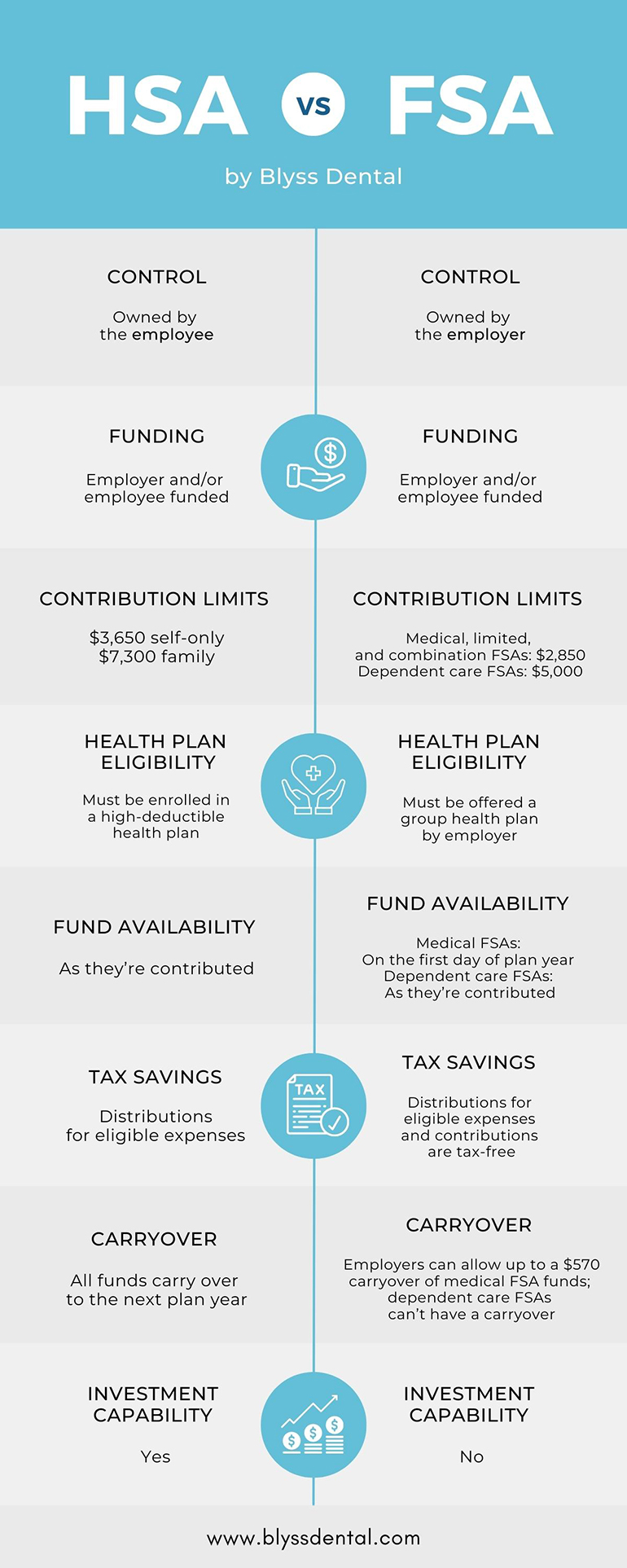
Both HSAs and FSAs are great ways to save for dental implants or other medical expenses—it just depends on what will work better for you based on things like whether or not you need help paying upfront costs and how much money you’re planning on spending overall.
Option 6: Borrow From Your Retirement Plan or Home Equity
Another option is to borrow from your retirement plan or home equity to pay for dental implants. Let’s take a closer look at each of these options.
Retirement Plans
If you have a 401k, IRA, or another retirement plan, you can usually borrow up to 50% of the funds without paying taxes or penalties. The interest rate on a loan is typically lower than a personal loan, and the repayment period is usually 5 years or less. One thing to keep in mind, though, is that if you leave your job before the loan is paid off, you will likely have to repay the entire loan within 60 days or face a 10% early withdrawal penalty.
Home Equity Loans
Another popular way to finance dental implants is with a home equity loan. With a home equity loan, you can borrow against the equity in your home (the difference between the amount of your mortgage and the current market value of your home). Home equity loans typically have lower interest rates than personal loans and credit cards, and the interest may even be tax-deductible. The downside of a home equity loan is that if you default on the loan, you could lose your home.
This is certainly not an ideal solution, as missing out on investment returns and potentially paying interest on the loan will likely negate any gains. But if you don’t have many other options, it might be worth considering nonetheless.
Dental Implant Tip: Be sure to talk with your dentist and financial advisor before making any decisions. They can help you determine which option is best for you based on your circumstances.
Option 7: Go on a Trip to Mexico
Are you considering dental implants but are put off by the high cost in the United States?
If so, you may be surprised to learn that you can pay for dental implants for much less by traveling to Mexico. In addition to being cheaper, getting dental implants in Mexico can also be a fun vacation!

If you’re considering getting dental implants, there’s no reason not to consider getting them done in Mexico. The cost savings alone are enough to make it worth your while…not to mention the fact that you can also enjoy a mini vacation at the same time.
There are many reputable clinics in Mexico that offer high-quality care at a fraction of the cost of what you would expect to pay in the US.
Of course, it is important to do your research before traveling and choose a reputable clinic with experienced dentists.
If you’re looking for a budget-friendly option that doesn’t involve loans, traveling to Mexico may be the answer.
The Cost of Dental Implants in Mexico
One of the biggest reasons to get dental implants in Mexico is the cost. You can save as much as 70% off the price of implants in the US by getting them done in Mexico.
The average cost of dental implants in Mexico from a good Mexican dentist is $1400 – $1800. That includes all the components of a full tooth replacement – the cost of the titanium post, abutment, and porcelain crown.
The average cost of the same procedure in the US is much higher at $3500-$5500. Dental implants are even more expensive in Canada, where they typically cost between $4500 and $6500.
If we do the math, you could save up to $4,000 on implants!
Dental Implant Tip: Finding a dentist in Mexico that you can trust can be challenging. This is especially true for complex dental implant cases. Of course, we would like you to get the dental work through Blyss Dental. But I want to ensure you are safe if you decide to go to Mexico. Save time and research by checking out a reputable company like Dayo Dental. Read about their comprehensive guide for booking a 2-in-1 holiday and dental trip to Mexico.
Option 8: Dental Grants
More and more people are looking into dental grants as a way to pay for expensive dental implants.
Many dental grant companies have popped up in recent years to help patients pay their dental implants. Some have a complex way of doing business. Some are legitimately funded by government agencies or foundations with strict income and need-based qualifications.
But many are lead-generation entities for participating dental offices. The dental offices pay a monthly fee to the grant providers for dental implant leads like yourself.
Here is an example of how it works.
You submit an application. Afterward, you connect with a participating dental office. You visit the dental office for a consultation and receive a quote for your implant procedure and a partial grant. This grant is typically a discount provided by the dental office, plus some small additional amount provided by the grant company.
Does it save you money? It could. It depends on the dental office.
Let’s say the typical cost for full-mouth All-on-4 Dental implants is $50,000 in your area. You may apply for a dental implant grant and get set up with a dentist that quotes you $70,000 for the same treatment. But you are receiving a $20,000 grant. So your out-of-pocket cost ends up being the same.
Dental Implant Tip: At the end of the day, what matters is what you would pay out of pocket, whether you have a grant or not. Did you receive a quote with a grant from a dental office? Get a second opinion with other dental offices to verify if you are really getting a “discount”. Get a free consultation with Blyss Dental to know if you are getting a fair price.
Option 9: Dental Schools
Dental school prices are about the same as Mexico’s. I was a dental student once. And I can tell you that we helped a lot of implant patients.
I think it is a good option if you are patient and not as picky.
Getting your dental implants at a dental school has three drawbacks:
1. You have to wait
A 6-month dental implant treatment at my office could take 1 year or more at a dental school. Why? There are vacations. There are different rotations. Students graduate. Schools require more follow-up appointments and protocols. You have to work around the student and instructor’s schedule.
2. You will be dealing with various students
Different students may handle your case from start to finish.
3. Your case is handled by a student
Yes, a student will be handling your case, not an experienced dentist. Of course, skilled instructors will supervise the cases. The aesthetic output might vary depending on how good the student is.
Option 10: Doing Nothing (Also Has Costs!)
Dental implants are not cheap. They cost several thousand dollars per tooth and sometimes even more.
That said, they are often worth the investment because they last much longer than other teeth replacement options, such as dentures or bridges.
However, I understand that not everyone can afford dental implants. So one option is to do nothing and just live with your current dental situation.
While this might seem like a good option at first, it’s important to understand that doing nothing comes with its own set of risks and costs.
It might not seem like it now, but dental complications can really sneak up on you if you don’t take care of them.
The Consequences of Doing Nothing
For example, if you have missing teeth, doing nothing will cause the surrounding teeth to begin shifting out of place over time. This can lead to a whole host of problems, including gum disease and bite problems.
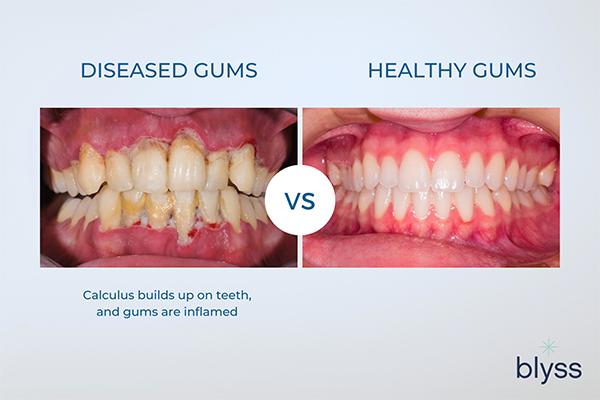
Missing teeth can cause many problems if left untreated. If you’re missing teeth, don’t wait to do something about it! Doing nothing will only cause more problems down the road.
It may not be apparent, but the longer you wait to get dental implants, the more jawbone loss you will experience. Excessive jawbone loss may also lead to higher healthcare costs since implant dentistry becomes more difficult to perform.
When your teeth are not healthy, it becomes difficult to make healthy food choices. Ignoring this problem will usually lead to higher healthcare costs down the road.
Not only are bad teeth unsightly, but they can also actually cause you to earn less money. Studies show that people with missing or decaying teeth tend to find it difficult to get a pay raise or a new job offer.
Dental problems may not only cost you money for treatment but also lose you job opportunities and wages.
Like I said before, dental complications can really sneak up on you if you don’t take care of them.
Let me give you an example. Say you have a chipped tooth. You might think, “Eh, it’s just a little chip. It doesn’t look that bad. I don’t need to go to the dentist right now.”
But over time, that little chip turns into a big crack, then an infection, that infection turns into an abscess and then… you get the picture.
See how things can quickly spiral out of control? Not to mention, each new complication will cost you more and more money.
So again, save yourself the trouble and have your dentist fix your teeth. Your future self will thank you.
Conclusion
There are several ways to get dental implants without breaking the bank or going into debt.
We would be happy to discuss our financing options with you and answer any questions you may have.
We also offer virtual consults if you live far from San Diego, California. Many of our patients travel from out of state to get their dental implants in our office.
If you’re ready to take the next step towards getting your smile back, schedule a free consultation with us today.
Sources Cited From
- Health Care Options, Using a Flexible Spending Account FSA. (n.d.). HealthCare.gov. https://www.healthcare.gov/
have-job-based-coverage/ flexible-spending-accounts - Health Savings Account (HSA) – Glossary. (n.d.). HealthCare.gov. https://www.healthcare.gov/
glossary/ health-savings-account-hsa/ - How Does Dental Insurance Work? (2022, March 9). Investopedia. https://www.investopedia.com/
articles/ personal-finance/ 111715/ how-does-dental- insurance-work.asp - creditrepair.com. (n.d.-a). https://www.
creditrepair.com/ blog/ finance/ how-to-pay-for -dental-work -with-bad-credit/ - 2022, N. O. U. D. D. B. | 2 8. (2022, November 28). What is the Cost of Full Mouth Dental Implants in Mexico? Dayo Dental. https://www.dayodental.com/
what-is-the-cost -of-full-mouth-dental -implants-in-mexico/



